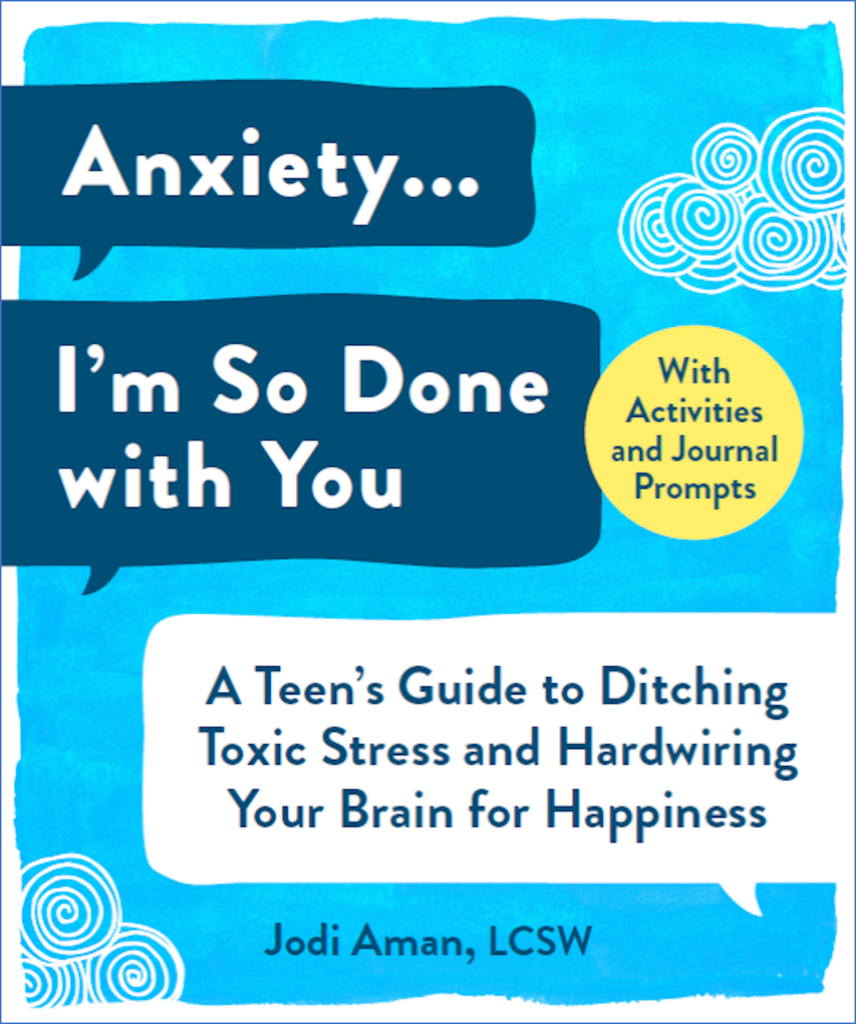New Book for Teens Highlights the Sneaky Ways Anxiety Can Show Up in Your Life
Editor's Note
If you want to have a conversation with people who “get it,” join The Mighty’s Chat Space group.
From “Anxiety . . . I’m So Done with You” by Jodi Aman, LCSW. Book excerpt courtesy of Skyhorse Publishing.
Once you know the ways anxiety exerts its power (by lying to your face), you can see it coming from a mile away and not be bothered, not believe it, not be available to it, and, yes, not even care what it has to say!
We are not just going to help you ditch anxiety when it arrives; we are going to take down anxiety’s power before it comes. All. The. Way. To. Zilch.
This first lie of anxiety:
“YOU HAVE TO KNOW WHAT’S WRONG.”
Whether it’s meeting with folks one-on-one, speaking, or being interviewed on television and podcasts, I get asked the same question over and over:
How do you know if you have anxiety?
Here are the worries implied in that query:
- Do I have a diagnosable mental illness? Am I normal?
- Is something wrong with me?
- Would you consider me sick?
- Am I irrational, or rational?
- Am I crazy?
- What do I have?
- Do I need, or even, deserve help? I need to figure it out!
This is what I know: People spend a lot of time and energy trying to understand exactly what they are up against, thinking that they will feel more in control once they know it. They assume the name of the problem will reveal how to handle it, and what to do to get rid of it.
On the one hand, they assume right. Something powerful happens when we know the name of our problem. We feel validated that we are not making it up! But more important, with a name, it becomes an entity outside of ourselves that we can take a stand against, and change our relationship with, so it becomes tangible. If this is your attitude, great! This will support your belief that you can heal and be on the path to healing quickly.
On the other hand, it becomes hazardous if and when the label becomes part of your identity (e.g., “I am mentally ill.”). Negative labels don’t feel good since they increase your shabby view of yourself. And, let’s face it: sometimes, even with a name, the monkey mind doubts it and takes your attention and energy on a wild goose chase because, What if you are wrong? It’ll keep you wondering as long as you give it attention. That’s exactly what the anxiety wants. You’re stuck looking behind, spinning your wheels, and beating yourself up instead of going forward. From this place, it is hard to see how you will ever feel better.
One sneaky way anxiety holds power is by hiding behind other problems and issues, so you stay distracted figuring out what you are up against. To do this, anxiety goes by many different names. Time to call it out.
Here are some of the names anxiety hides behind: (Don’t just scan the list! Read each name and think about how you relate to these. Circle the ones that resonate!)
- Fear
- Worry
- Worrier
- Worrywart
- Nervousness
- Anxiety
- Panic
- Shyness
- Mental illness
- Mental health
- Emotional
- Attention seeking
- Embarrassment
- Discomfort
- Desperation
- Out of control
- Control freak (controlling)
- Stress
- Distress
- PTSD
- Confusion
- Overwhelmed
- Stress
- Distress
- OCD
- Resistance
- Emotional block
- Terror (terrified)
- Shook
- Stuck
- Weak
- Immobilized
- Irritable
- Impatient
- Frustration
- Dissociation
- Depression
- Grief
- Eating disorder
- Disinterested
- Breakdown (nervous breakdown)
- Losing it (your mind)
- Weird feeling
- Dread
- Manic
- Obsessed
- Preoccupied
- Rumination
- “Monkey mind”
- Selfish
- Sensitive
- Needy
- Doubt
- Disinterest
- Hopeless
- Worthless
- No point
- A mess
- Phobia(s) (acrophobia, agoraphobia, claustrophobia, emetophobia, arachnophobia)
Are all of these anxiety?
You may think “some of these aren’t anxiety” because “real anxiety is worse” than these. Please note: People feel suffering in different intensities and use different words. This doesn’t mean they are not feeling it as badly as you. It is entirely possible that they feel it worse than you, but call it something you’d consider less of a big deal.
Happens all the time.
A girl, who suffered panic attacks, was quite offended every time her friend said, “That gives me such bad anxiety!” when the class was assigned an English essay. She thought her friend was making light of anxiety. Listen, anxiety is invisible. How many people have no idea you have it? Most people? Yep. So many more people have it even though they may look like they don’t have it. In fact, rarely does someone look like they have it. It is more probable that her friend suffers from real and horrible anxiety rather than making light of it.
It doesn’t matter if you have enough anxiety or are truly mentally ill to warrant help. These terms are relative. “Relative” means you cannot define them exactly. Though each has become a term that we recognize, there is no universal definition for anxiety or mental illness. They mean what they mean to the person who is uttering them.
While the Diagnostic and Statistical Manual of Mental Disorders outlines a list of symptoms for each diagnosis, a great deal of the practitioner’s subjectivity (opinion) comes into play when they make a diagnosis. This is why I prefer to use words as descriptions rather than labels, because then the subjectivity is implied, for example, feeling anxious, feeling suffering, and feeling emotional turmoil.
You might be able to handle having a bad day once in a while, but if it turns into weeks, or even months, why stay there just because you don’t know if the situation is bad enough to warrant help? All that matters is that you want a change. You deserve support anytime your emotions are bothering your life.
To read more, preorder “Anxiety . . . I’m So Done with You” here, available July 7.
Header image via tommaso79/Getty Images


